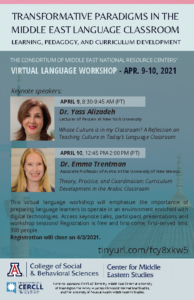Consortium of Middle East National Resource Centers’ Virtual Language Workshop
Transformative Paradigms in the Middle East Language Classroom: Learning, Pedagogy, and Curriculum Development

The 2016 Western Consortium Middle East Language Workshop saw the importance of preparing language learners to operate in an environment enriched with digital technologies. The 2021 Middle East National Resources Centers Virtual Language Workshop seeks to build on this knowledge and to examine the transformative paradigms emerging as we move more and more into the online realm. Transformative pathways in pedagogy go beyond instrumental innovations to address social issues and multilingualism in the classroom.
With guest speakers:
- Dr. Yass Alizadeh (Lecturer of Persian, New York University), Whose Culture is in my Classroom? A Reflection on Teaching Culture in Today’s Language Classroom
- Dr. Emma Trentman (Associate Professor of Arabic, University of New Mexico), Theory, Practice, and Coordination: Curriculum Development in the Arabic Classroom
and 5 panels: New Paradigms in Teaching Culture; Curricular Design and Instructor Training for Today’s World; Collaboration in Online Learning; Multiliteracies, Performance and Assessment; and CERCLL Projects and Pedagogical Tools.
Panel 5 on Saturday April 10th focusses upon three projects that are supported by CERCLL: CERCLL Projects and Pedagogical Tools, moderated by CERCLL Co-Director, Chantelle Warner.
Panel Summary: The Center for Educational Resources in Culture, Language and Literacy (CERCLL) is a Title VI Language Resource Center at the University of Arizona. Its free resources and professional development opportunities focus on incorporating cultural awareness and multiliteracies into language teaching. Among the resources it supports are: a project researching linguistic complexity as one of the four markers of proficiency in L2 students studying Arabic; a Persian picture dictionary with accompanying audio files for college students; and Foreigncy.us, a platform used in an Arabic and Hebrew media class using completely authentic media materials for students at intermediate mid to advanced low on the ACTFL scale in an online, inclusive classroom.
Paper 1: Developing a Pedagogical Tool for Arabic and Hebrew College Students Using Current Events Online Media from the Middle East, by Hanna Tzuker Seltzer, Ragy H. Ibrahim Mikhaeel and Franziska Lys (Northwestern University)
In our presentation we will share a unique course we taught for our Arabic and Hebrew students using Foreigncy.us. We will demonstrate how the use of authentic materials spanning politics and social issues helped students explore the specialized language of Media and build a comprehensive vocabulary in a virtual environment. (The Foreigncy site is operated by CERCLL.)
Paper 2: Enhancing Linguistic Complexity in L2 Arabic Using Interactive Task-based Instruction, by Mahmoud Azaz (University of Arizona) and Hicham Assaoui (Virgnia Military Institute)
In this talk, we present the results of a study that enhanced language complexity in Arabic using interactive-task-based learning. Also, we provide training on task-based lesson planning. We conclude by discussing the potential of interactive task-based learning in bridging the gap between instruction and proficiency assessment in ME languages pedagogy. – This project is funded in part by CERCLL’s Title VI Language Resource Center grant, as well as by the Center for Middle Eastern Studies and the Graduate College at the University of Arizona. There is more information about it here, and there will be a full workshop on this project next year.
Paper 3: An Online Theme-based Persian Picture Dictionary, by Narges Nematollahi (University of Arizona)
This presentation introduces an online Persian picture dictionary and discusses the ways through which similar dictionaries can be developed for other languages. The resource will offer a multimedia environment in which items in theme-based images are matched with words written in the Persian script accompanied by an audio file for pronunciation.
Dr. Nematollahi was was awarded a CERCLL Faculty Research Fellowship to support this project, and it was granted additional funds from the Center for Middle Eastern Studies. There is more about this project and the other 2020 Faculty fellows here.
See the full details on the University of Arizona’s Center for Middle Eastern Studies workshop page, including contact information for those who have questions. Registration is free, but there limited spaces.
CERCLL is a co-sponsor of this event.

